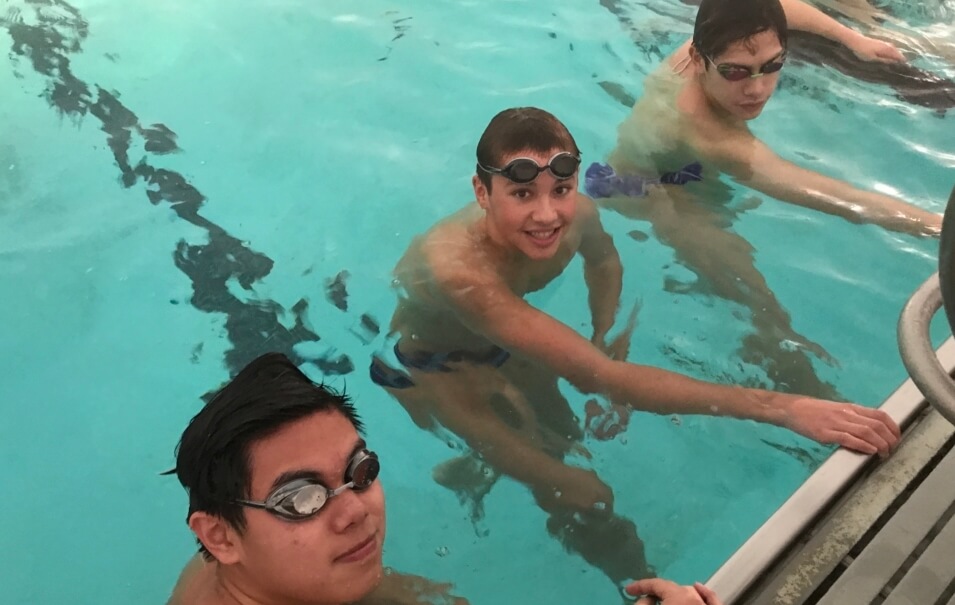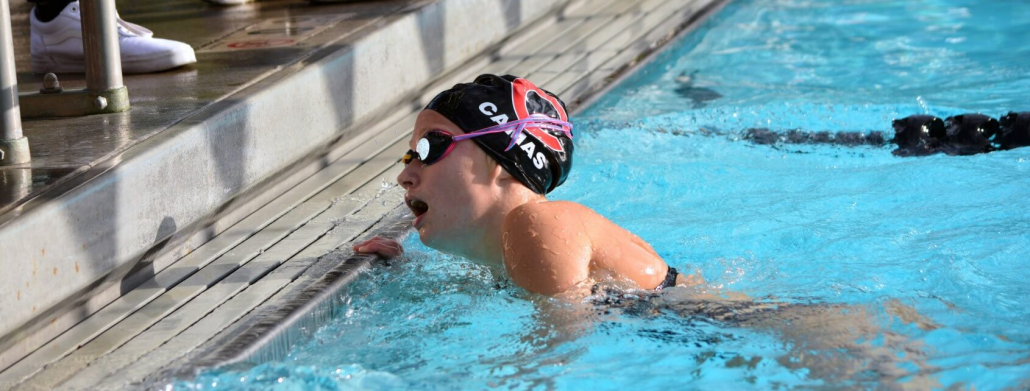Camas, WA — The two-time, back-to-back State Champion Camas High School (CHS) Boys Swim team lost their home pool several weeks ago as negotiations between Lacamas Athletic Club and the CHS Athletics Department failed to reach an agreement.
Fortunately, Cascade Athletic Club stepped up and took in the displaced team, but it hasn’t been without challenges. The venue change has forced the Varsity swimmers to begin practices at 5:30 am, which gives the boys ample lane space to maximize workouts. Junior Varsity practices in the evenings, beginning at 7:15, which alleviates lane congestion.
It also forces the champion athletes to get up before 5 am, travel to Vancouver, practice, then rush to shower, change, and drive or bus to CHS. It’s not ideal, but the team is adjusting.
“It takes an extra 10 minutes to get here,” said CHS sophomore, Jack Harris. “We have to get here pretty early. It’s not too bad, at least we have afternoons to get homework done, but it’s still a big change from last year. We’ll do our best given the situation.”
On day one, Head Coach Mike Bemis gave the entire team a tour of the facility, and thanked Cascade for their generosity. The team practices alongside competitors at Union, Mountain View, Evergreen, and Heritage.
“We’re treating this season like a new season,” said co-captain, Chris Xia. “We’re not really gonna focus on our past titles, we’re just going into this year trying our best and yeah we have some swimmers who have left, but we’re just gonna try to make up for them, and do the best we can.”

Camas Swim team captains, from left: Chris Xia and Austin Fogel.
The team won State titles in 2017 and 2018, thanks to amazing talent, and coaching strategies. But, they also lost three star athletes — Finn McClone and Mark Kim — to graduation, as well as Eric Wu, who dropped the team this year because of losing Lacamas Athletic Club as their home pool.
“The Camas High School Boys swim team is about to start training for our third state title,” said Wu. “I find it near impossible if we can’t do that without our pool. The past few seasons we were able to train in the afternoon at Lacamas. Not only does swimming in the morning affect our training, but it affects our whole day during school. Without proper sleep and a home pool, how will we put together another strong state team?”
Losing Wu was a blow, but the team is soul-searching, and working hard to fill in the gaps.
”We’re still gonna try hard to defend our State title,” said co-captain, Austin Fogel. “Hopefully some of the underclass men will step up and fill those shoes. We have some really fast swimmers.”
Their first meet of the season is today at Curtis High School.

www.michaelnutterjewelry.com
Background
So, how did a two-time State Championship team lose their home pool?
Several months ago, Denise Croucher, owner and operator of Lacamas Athletic Club, expressed her desire to have a member of her club staff serve as assistant coach to both the boys and girls Camas High School (CHS) swim teams. Athletes from several private clubs swim for CHS, including Lacamas Headhunters, Columbia River Swim Team (CRST), Portland Athletic Club, and Mt. Hood.
CHS and Bemis say Croucher wanted to be head coach, which Croucher denies.
Croucher’s demand to coach was met with resistance from CHS, whose loyalty remains to Bemis, who has brought home two back-to-back state champions. Negotiations between the two entities ended with the girl’s team being forced out and finding a new, temporary home at Cascade Athletic Club.
“Yes, we will continue to swim at Cascade Athletic Club for the boys season,” said Rory Oster, CHS Athletic Director. “We are grateful for the great management and leadership at Cascade who is willing to do whatever they can to help our program, and we will make it work. Again, our preference would be to swim at the local Lacamas Athletic Club and are disappointed an agreement could not be made.”

Front, left to right: Jack Duerfeldt and Luke Bales. Back, left to right: Zach Macia and Ben Taylor.
Croucher said she thought they were still in negotations, and was shocked when the girl’s team switched over to Cascade. At the time, CHS had hoped they could salvage the relationship and keep the Lacamas pool for the boy’s season.
There’s been bad blood between Croucher and CRST for more than 15 years, but Darlene Hill, owner and operator of CRST, says “There’s nothing there that can’t be fixed — the focus should be on the kids who all get along very well. The swimming community generally gets along well. This is very obtuse.”
Bemis said over the years Lacamas Athletic Club has manufactured tensions, but “we always found a way to work it out.”
Parents have complained that Lacamas Athetic Club management was seldom prepared for home meets, and that facilities haven’t been properly maintained. Croucher said their facilities were vandalized during home meets, and that the costs of opening the pool for the CHS team were too high. CHS pays $20,000 each season to Lacamas Athletic Club to lease lanes at their facility, said Croucher.
“They pulled all shower plumbing off the locker rooms, they played with heaters and they ruined a locker room heater,” said Croucher. “Other teams would leave a mess in the locker room after each swim meet. We had a huge mess every single day after practice. Garbage strewed across the locker room. The attitude was very negative from outside swimmers. They don’t respect it like its theirs. Honestly, sometimes I don’t think we want them back here. It has been so nice to have our team, staff and employees without the high school teams.”
But, she also feels bad a deal couldn’t be worked out.
“It’s not something we really want,” said Croucher. “We want the kids to be able to swim, so I’m a supporter of that. But, we have to find a way that it doesn’t impact the business so much. I also want a member of my staff coaching the team, that way our interests are represented at every practice, and at every meet. I’m open to suggestions.”

From left: Chris Xia, Dave Peddie, and Austin Fogel.
Bemis said the politics of the situation have been a challenge for more than a decade, and that they’ve always found a way to work it out. But, not this year.
“Leslie (the assistant coach) and I aren’t even allowed on the Lacamas Athletic Club premises anymore,” said Bemis. “It’s gotten that bad. Denise wants to coach both Camas High School teams, and if she doesn’t get that, then the Camas teams aren’t allowed to practice or compete there. It’s not a good decision.”
Bailey Segall, of the CHS Girls swim team, said that Lacamas Headhunter swimmers even petitioned Croucher to change their minds.
”They went in there and begged Denise to change her mind, but she wouldn’t listen,” said Segall. “Nobody is really happy about this.”
-

-
The team is adjusting to their new surroundings, and making it work.
-

-
Day one at Cascade Athletic Club.
-

-
Freezing outside the bubble at Cascade Athletic Club.
-

-
It’s cold outside! Entering the bubble at Cascade Athletic Club.













































































